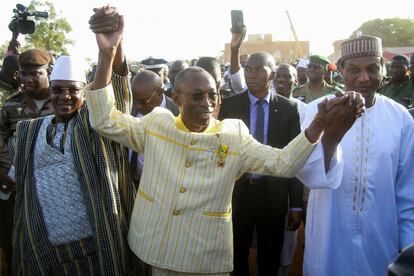US weighing options in Africa after Niger junta orders departure from key counterterrorism base
Pentagon officials said U.S. had ‘lengthy and direct’ discussions with the junta officials that were also in part spurred by concerns over Niger’s potential relationships with Russia and Iran

The Pentagon is working with Niger officials, seeking a way for U.S. troops to stay in the country — a key base for counterterrorism operations in sub-Saharan Africa — following a weekend directive that they leave.
Last week a high level-delegation of U.S. officials, including Assistant Secretary of State for African Affairs Molly Phee, Assistant Secretary of Defense for International Security Affairs Celeste Wallander and the head of U.S. Africa Command Gen. Michael Langley, traveled to Niger to meet with members of the military junta.
Pentagon deputy press secretary Sabrina Singh said Monday the U.S. officials had “lengthy and direct” discussions with the junta officials that were also in part spurred by concerns over Niger’s potential relationships with Russia and Iran. “We were troubled on the path that Niger is on,” Singh said.
On Saturday, following the meeting, the junta’s spokesperson, Col. Maj. Amadou Abdramane, said U.S. flights over Niger’s territory in recent weeks were illegal. Meanwhile, Insa Garba Saidou, a local activist who assists Niger’s military rulers with their communications, criticized U.S. efforts to force the junta to pick between strategic partners.
“The American bases and civilian personnel cannot stay on Nigerien soil any longer,” he told The Associated Press.
Singh said the U.S. was aware of the March 16 statement “announcing the end of the status of forces agreement between Niger and the United States. We are working through diplomatic channels to seek clarification. These are ongoing discussions and we don’t have more to share at this time.”
State Department spokesman Vedant Patel said the discussions were prompted by Niger’s “trajectory.”
“We are in touch with transition authorities to seek clarification of their comments and discuss additional next steps,” Patel said.
The junta has largely been in control in Niger since July when mutinous soldiers ousted the country’s democratically elected president and months later asked French forces to leave.
The U.S. military still had some 650 troops working in Niger in December, largely consolidated at a base farther away from Niamey, Niger’s capital. Singh said the total number of personnel still in country, including civilians and contractors, is roughly 1,000.
The Niger base is critical for U.S. counterterrorism operations in the Sahel and has been used for both manned and unmanned surveillance operations, although Singh said the only drone flights being currently conducted are for force protection.
In the Sahel the U.S. has also supported local ground troops, including accompanying them on missions. However, such accompanied missions have been scaled back since U.S. troops were killed in a joint operation in Niger in 2017.
Sign up for our weekly newsletter to get more English-language news coverage from EL PAÍS USA Edition
Tu suscripción se está usando en otro dispositivo
¿Quieres añadir otro usuario a tu suscripción?
Si continúas leyendo en este dispositivo, no se podrá leer en el otro.
FlechaTu suscripción se está usando en otro dispositivo y solo puedes acceder a EL PAÍS desde un dispositivo a la vez.
Si quieres compartir tu cuenta, cambia tu suscripción a la modalidad Premium, así podrás añadir otro usuario. Cada uno accederá con su propia cuenta de email, lo que os permitirá personalizar vuestra experiencia en EL PAÍS.
¿Tienes una suscripción de empresa? Accede aquí para contratar más cuentas.
En el caso de no saber quién está usando tu cuenta, te recomendamos cambiar tu contraseña aquí.
Si decides continuar compartiendo tu cuenta, este mensaje se mostrará en tu dispositivo y en el de la otra persona que está usando tu cuenta de forma indefinida, afectando a tu experiencia de lectura. Puedes consultar aquí los términos y condiciones de la suscripción digital.








































